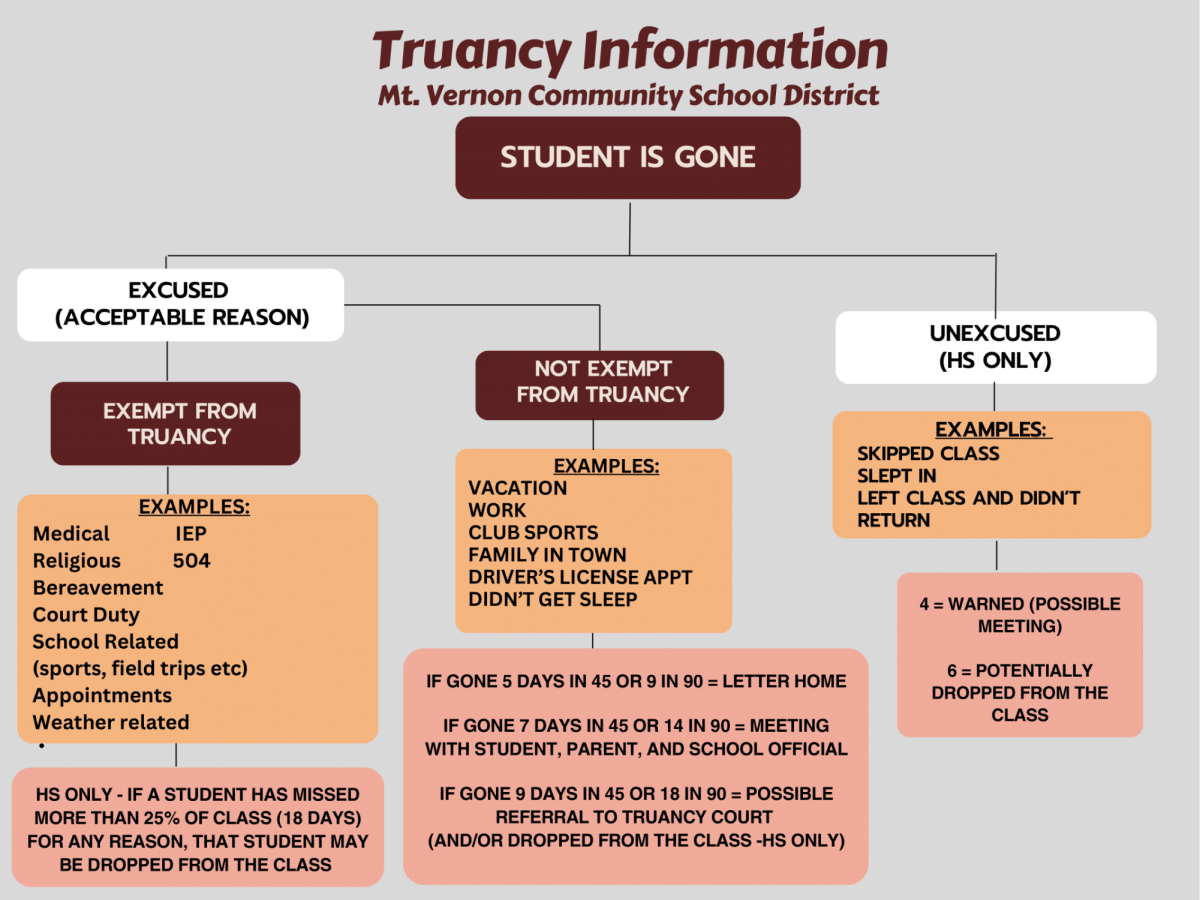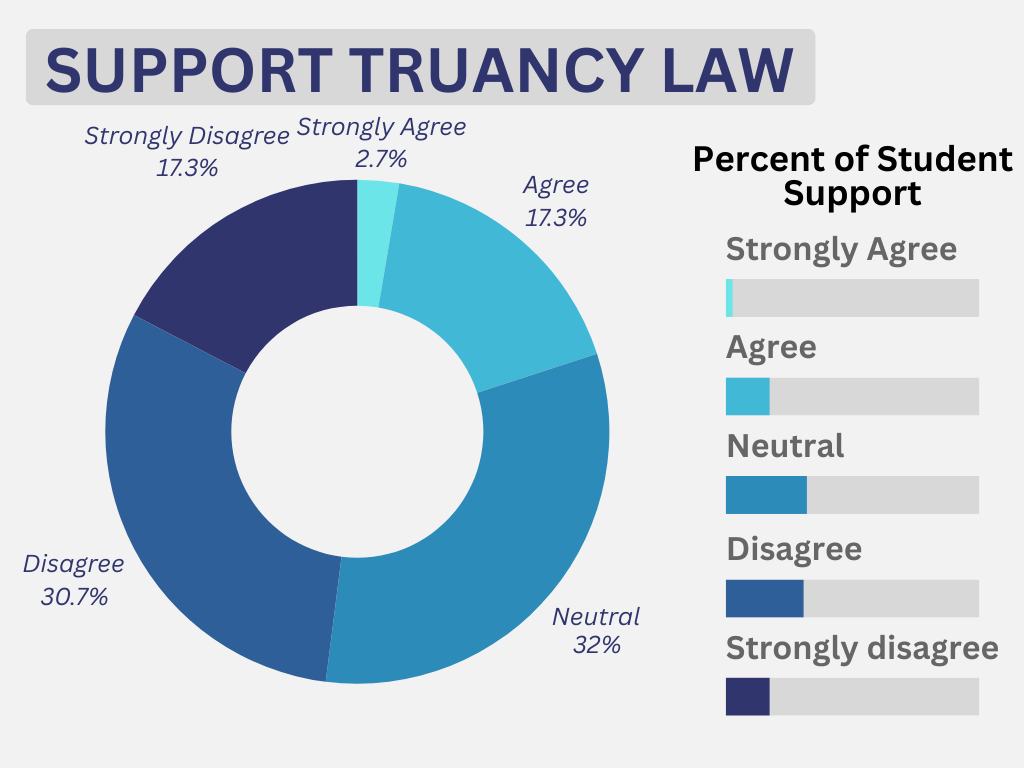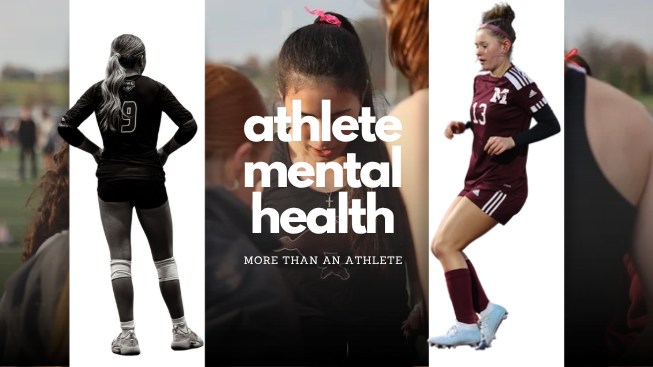The new Iowa Truancy Law has been controversial since its introduction on May 9. It took effect on July 1, 2024, and requires students to attend school for a minimum of 80% of school days before students become truant. Parents become liable for their child’s attendance and will be referred to the county attorney for potential civic enforcement. The law was created to reduce chronic absenteeism and hold parents accountable.
The Senate File 2435 under the Iowa legislature details the public school attendance requirements. It states that a student is considered truant if they accumulate 20% or more non-exempt absences, including excused but non-exempt absences (such as family vacations or undocumented medical appointments) and unexcused absences (such as skipping school or failing to provide a reason). Truancy is solely determined by non-exempt absences, regardless of whether the school has approved them. Every Iowa school has an attendance policy and is required to keep track of days missed. Partial days missed are counted by the periods and add up to the number of days.

Many students take issue with the new Truancy Law. An email survey was given to Mount Vernon High School students in November, receiving 75 responses, and showed that 48% of students don’t support the Truancy Law. Additionally, 2 in 3 respondents believe the law is too strict. Being truant 9 out of 45 days or 18 out of 90 will have parents face up to 10 days in jail or a 100 dollar fine for the first offense.

A problem some people see with the new Truancy Law is the medical exemption. To be exempt from the Truancy Law a student must get documentation to show that they have a valid medical reason to miss school. Getting a doctor’s note has its own issues. Firstly, parents have to find time outside of work to set up an appointment and take their children to the doctor. If families don’t have good health insurance, a check upwards of 100 dollars every time students need to get out of school for illness or injury. Because of this, many students feel that it’s not worth going to the doctor and would rather go to school out of fear of missing days even though they know they risk spreading illness to other students.
An anonymous student from the email survey said, “I’ve gotten sick from people who came to school ill out of fear of missing too many days.”
Another student said, “It’s a lot to get a doctor’s note for flu symptoms. I just end up going anyway” further solidifying that at least some students feel they need to go to school even if they’re sick, exposing others to illness. Students who have a tendency to get sick or injured frequently can struggle to get exemptions from the law and even when students are fortunate enough to get a doctor’s note it only covers a strict period, and if the student is sick for longer, they would have to have an additional appointment.
The Truancy Law tends to scare students into going to school. Each year students get 8 sick days (2 sick days a quarter) that don’t count toward students’ truancy status. In a school building filled with students who feel they need to go to school sick, packed together 7 hours a day, during fall and winter when disease spreads like wildfire, it can be hard not to contract some sort of illness from the hundreds of close contact incidents. “I feel like I have to go to school even if I don’t feel well,” said Elsie Owen, a senior.
Many students feel personal responsibility to force themselves to go to school so they don’t become truant, or so their parents don’t face jail time.
A main benefit to the Truancy Law is when a parent is on the fence about forcing their child to go to school and the law gives them the push to make them attend school. Assistant Principal Matt Thede shared statistics on recent student attendance, “Last year 91 percent of students came to school 90 percent of the time, and this year it’s 94 percent,” the increase of 3 percent is small, but valuable to showing that it does increase students’ attendance.
The new Truancy Law in Iowa was passed with good intentions but comes with unintentional hardships. Whether students are sick and struggle to get doctors appointments or are genuinely skipping class, a rule was put in place to help parents push their child to go to school. The Truancy Law has slightly increased student attendance at Mount Vernon High School.







